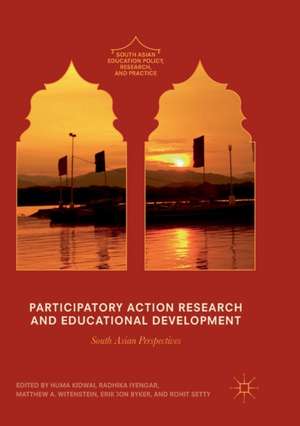Participatory Action Research and Educational Development: South Asian Perspectives: South Asian Education Policy, Research, and Practice
Editat de Huma Kidwai, Radhika Iyengar, Matthew A. Witenstein, Erik Jon Byker, Rohit Settyen Limba Engleză Paperback – 21 iun 2018
Preț: 202.26 lei
Nou
Puncte Express: 303
Preț estimativ în valută:
38.71€ • 39.99$ • 32.21£
38.71€ • 39.99$ • 32.21£
Carte tipărită la comandă
Livrare economică 26 martie-09 aprilie
Preluare comenzi: 021 569.72.76
Specificații
ISBN-13: 9783319840437
ISBN-10: 3319840436
Ilustrații: XXIX, 290 p.
Dimensiuni: 148 x 210 mm
Greutate: 0.39 kg
Ediția:Softcover reprint of the original 1st ed. 2017
Editura: Springer International Publishing
Colecția Palgrave Macmillan
Seria South Asian Education Policy, Research, and Practice
Locul publicării:Cham, Switzerland
ISBN-10: 3319840436
Ilustrații: XXIX, 290 p.
Dimensiuni: 148 x 210 mm
Greutate: 0.39 kg
Ediția:Softcover reprint of the original 1st ed. 2017
Editura: Springer International Publishing
Colecția Palgrave Macmillan
Seria South Asian Education Policy, Research, and Practice
Locul publicării:Cham, Switzerland
Cuprins
Introduction: Participatory Action Research and Education – Key Approaches and Debates.- Chapter 1. Defining PAR to Refine PAR: Theorizing Participatory Action Research in South Asian Educational Contexts.- Chapter 2. Utilizing “a version of PAR” to explore children’s voices on inclusion: The case of two primary schools in Bangladesh.- Chapter 3. The ASER ‘Translating Policy into Practice’ Toolkit: From Participatory Action Research to Evidence-Based Action.- Chapter 4. Northern Province Education System in Sri Lanka: Participatory Review, Recommendation, Implementation and Monitoring.- Chapter 5. Unpacking Participation: The Case of Child-Centered Pedagogy in India.- Chapter 6. Learning and evolving in Hybrid Learning: a PAR perspective.- Chapter 7. Reclaiming the collective: challenging neoliberal ideology through PAR.- Chapter 8. Applying participatory action research to program evaluation in education policy.- Case Study 1: Photovoice & Girls’ Education in Gujarat, India.- CaseStudy 2: Utilizing memoing as a reflexive tool in PAR.- Case Study 3: One Moment of Participatory Data Analysis.- Case Study 4: Shikshagiri – Including Marginalised children in Policy and Praxis of Education.- Conclusion: Reading and Rewriting South Asia.
Notă biografică
Huma Kidwai is an education consultant with the World Bank’s Sub-Saharan Africa Division (Education–Global Practices). She holds an EdD from Teachers College, Columbia University, USA.
Radhika Iyengar is Director of Education for the Millennium Villages Project (MVP), Center for Globalization and Sustainable Development at the Earth Institute, Columbia University, USA.
Matthew A. Witenstein is Postdoctoral Fellow in the School of Education at University of Redlands, USA, where he helps coordinate the doctoral program.
Rohit Setty is a recent United States–India Educational Foundation Fulbright–Nehru Fellow with the National Council of Educational Research and Training’s Regional Institute of Education, Mysore, India, and a graduate of theUniversity of Michigan, USA.
Textul de pe ultima copertă
This volume brings together diverse thinkers and practitioners on Participatory Action Research (PAR) and educational development in South Asia. Contributors draw from their research and field experiences on how PAR is currently being understood, theorized, debated, and implemented for the education of children in South Asia. This book will act as a key reference text for academics, students, and practitioners interested in the intersection of education and participatory development in the region. The book opens a constructive debate on PAR approaches to education and proposes a reflective framework that allows the reader to develop their perspectives about the conceptual, methodological, and sociopolitical potential and limitations of participatory approaches.
Caracteristici
Examines how Participatory Action Research (PAR) is currently being understood and practiced among the diverse communities of education practitioners and policymakers in South Asia Brings together assortment of authors from the field of education and participatory development, representing strong believers in participatory approaches in research, extension, and development, as well as skeptics Offers a combined focus on PAR, education, and South Asia drawing from the socio-cultural approach to policy analysis



